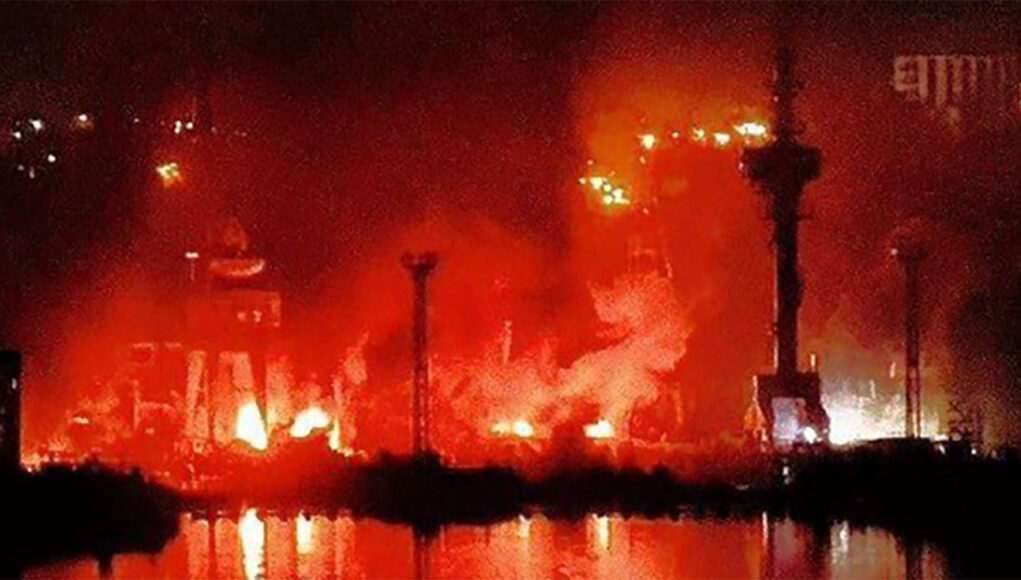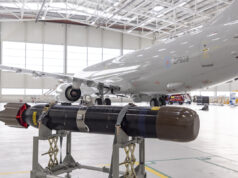Ukraine war: ten years after Putin annexed Crimea, Russia’s grip on the peninsula looks shaky.
It is ten years since Russia illegally annexed Crimea on March 18 2014. Subsequent efforts to firmly integrate the peninsula into the Russian Federation, however, have been far from the success story that the Kremlin often likes to portray.
In fact, comparing the increasingly shaky grip that Moscow has on the peninsula today with the situation before the annexation would suggest that Russia’s strategic position has actually worsened over the past decade.
This article is the opinion of the author and not necessarily that of the UK Defence Journal. If you would like to submit your own article on this topic or any other, please see our submission guidelines.
The Kerch bridge between Crimea and Russia opened to much fanfare in 2018 with the Russian President, Vladimir Putin, driving a truck across it. It has become a symbol not only of Russian occupation of Crimea, but also of Ukrainian resistance. Spectacular Ukrainian attacks in October 2022 and July 2023 exposed the tenuousness of Russia’s connection to the peninsula.
Not only that, but repeated missile and drone attacks on Russian installations in Crimea and partisan activity in Crimea have further heightened the sense of Russian vulnerability.
Black Sea successes
Most significant of all, Russia’s Black Sea fleet has suffered significant losses over the past two years. As a result of these Ukrainian successes, the Kremlin decided to relocate the Black Sea fleet from Sevastopol to Novorossiysk on the Russian mainland. Compare that with the situation prior to the annexation of Crimea in 2014 when Russia had a secure lease on the naval base of Sevastopol until 2042.
Moreover, the Turkish closure of the Bosphorus and Dardanelles shortly after the start of Moscow’s full-scale invasion of Ukraine in February 2022 means that Russia can no longer freely move war ships in and out of the Black Sea. This makes losses, like those of the Black Sea fleet’s flagship cruiser Moskva in April 2022 and recently the patrol boat Sergey Kotov and the amphibian landing ship Caesar Kunikov, even more of a strategic blow to Russian capabilities.
These attacks also have a significant symbolic value for Ukraine and its allies. While the 2023 Ukrainian counteroffensive on the mainland failed to deliver on expectations, Kyiv’s deft deployment of air and sea drones and of longer-range missiles ensured a remarkable change of fortunes in the Black Sea. This was underlined recently when the Kremlin removed its second commander of the Black Sea Fleet since the invasion of Ukraine.
Momentum around Crimea clearly seems to be on Ukraine’s side. Earlier this month, Ukrainian intelligence chief Kyrylo Budanov signalled that a major operation aimed at further loosening Russia’s grip on Crimea was imminent.
Apart from the strategic military and symbolic value of these Ukrainian successes, there is also a clear economic benefit. After Russia’s withdrawal from the Black Sea grain initiative brokered by Turkey and the United Nations, the fact that Moscow lost naval superiority in the Black Sea enabled Kyiv to establish its own shipping corridor.
This now carries key Ukrainian agricultural exports to global markets at levels exceeding those during the period when the grain deal was actually in operation.
Russia nervous
This is overall undeniably good news at a time when there are many grim assessments of Ukraine’s prospects in this illegal Russian war. The renewed and arguably more optimistic focus on Ukraine was also obvious in recent comments by the French president, Emmanuel Macron.
Recognising the strategic importance of the peninsula, including for the security of EU members such as Romania and Bulgaria with their own Black Sea coastlines, Macron insisted that restoring Ukrainian sovereignty over Crimea was essential for lasting peace in the region.
This contrasts sharply with a move by lawmakers in the Duma, Russia’s parliament. Members introduced a draft bill on March 11 that seeks to annul the transfer of Crimea from Russia to Ukraine by former Soviet leader Nikita Krushchev in 1954.
It is not clear what, if any, effect such a law would have on the international legal status of Crimea as part of sovereign Ukrainian territory. But it suggests a degree of nervousness in Moscow regarding its grip on the peninsula.
This does not mean, however, that Russia is in any imminent danger of losing Crimea, let alone of losing the war that it has illegally fought against Ukraine both overtly and covertly for a decade now. The importance of Crimea in this war was established long before the beginning of Moscow’s full-scale invasion in February 2022.
And Putin and his proxies have threatened the use of nuclear weapons on more than one occasion if Russian were in danger of being forced out of Ukraine. These threats may been overblown, but they indicate the level of determination with which Moscow is committed to holding onto Crimea.
Ukrainian efforts have clearly demonstrated, however, that the Kremlin’s, and Putin’s personal, commitment may not be enough to secure Russia’s hold forever. Kyiv’s western partners would do well to remember that among the spreading gloom over the trajectory of the war.![]()
Stefan Wolff, Professor of International Security, University of Birmingham. This article is republished from The Conversation under a Creative Commons license. Read the original article.














I think a negotiated settlement is on the cards so long as Ukraine can get its foot in the door and make the Crimea’s annexation look highly uncertain.
Then an exchange of the peninsular for the bombed out and mined remains of the Donbas etc. might be worth pursuing.
That Eastern strip of land is now basically worthless for the next 50 years and nigh on unliveable.
Russia gets its buffer zone. Ukraine gets a coherent and unbroken Southern coast and the war is brought to an end. The only losers will be the Eastern separatists who basically started this disaster in the first place.
Given Russia’s building momentum and gradual re-industrialisation it would benefit the Ukraine substantially if they could do this sooner rather than later.
Regards the Ukrainian emasculation of the Russian Navy, you can’t help but laugh at how Putin appointed Admiral Alexander Moiseyev -a submariner- as the head of the Russian Navy after he sacked the previous incumbent Admiral Nikolai Yevmenov regards presiding over so many losses. Oh the irony.
For me this is a ‘nothing’ article which does not give us anything we did not already know?
Yep. unfortunately quality from universities are now unexpected occurrence.
It even misrepresents “grip” . Are we seeing a rebellion or even a mild rejection from Crimea population for example?
If you look at the long term geographic needs of both Russia in Ukraine, then partition of Crimea should be part of the peace deal. Ukraine needs North Crimea, as it controls the approaches to Odessa. Russia needs South Crimea for the ice free port of Sevastapol.
John wrote:
“”Russia needs South Crimea for the ice free port of Sevastapol.””
Actually when it looked like Ukraine wasn’t going to renew the lease of the Crimea (which it did in 2010) Moscow in 2003 started building a replacement ice free base in Novorossiysk which saw Putin sign a presidential decree setting up the base and allocating about US$480 million for its construction between 2003 and 2012, However that deal over the Crimea (till 2042) slowed down that build and it became operational in 2019. However due to Ukraine’s ability to target and hit military assets in the Crimea and Novorossiysk. Moscow has decided to build a new base even further away from the Ukraine in Georgia , well the breakaway Georgian region of Abkhazia, which as the crow flies is 200 miles SE of Novorossiysk and just shy of 400 miles from Sevastopol
I was going to say exactly that; Crimea no longer has the same strategic value to Russia that it previously did- especially with Russia’s long-term lease of their port in Syria as well giving them an even greater reach from their own shores. Granted, the way it sticks out into the Black Sea does still allow a certain level of control over the water via aircraft and long range anti-ship missiles.
Ultimately, I think the truth of it is that Crimea’s strategic value was always secondary to Putin’s dream to once again be able to take summer holidays on the peninsula- like in the good old days.
I cannot see Russia giving up Sevastopol & the Kerch bridge.
I fully agree, it’ll be a fight every step of the way- and probably the greatest risk of Russia actually going nuclear..!
Putin says “So what if my grip on Crimea is shakey? I’ll just turn it into a permanent no-man’s-land.”
That’s a good summary. Thank-you.
putin is not listening he just changes his generals